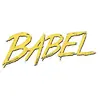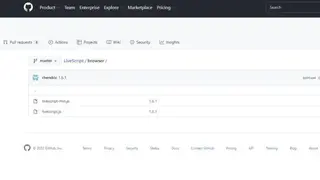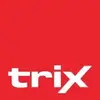
LiveScript
LiveScript is another JavaScript compiler that allows the users to compile expressive codes to JavaScript. It includes many features to assist the coding into functional-style programming. It is basically designed to increase the expressiveness and the code beauty of the program. It is helpful in high-level functional coding and has many features that help the users to perform faster than others. For mapping and shipping purposes it uses terse syntax for common functional operations.
It is equally beneficial in solving the issues of coffee-script scoping and may support the WebStorm and Visio Studio. It is considered as the complete compiler chain Web Assembly that has the ability to convert OpenGL into WebGL and may support APIs like SDL, threads, and POSIX. It includes the core features of Compiler, JavaScript, Portable, C++, C++ Development, and many more. It is easily compatible with the operating system of Windows and Mac.
LiveScript Alternatives
#1 JavaScript
JavaScript is a popular programming language that is easy to learn and helps the learner from becoming a learner to an expert in it. It is helpful in creating dynamic and interactive web content in a variety of ways like applications and browsers. It is being used in 97% of all websites and may use as the client-side programming language in many fields. It has a user-friendly interface that is flexible to use and fully customizable.
It is basically a high-level language that can easily be embedded with many languages like HTML. Apart from creating websites, it is also used to build browser-based games and mobile applications for different operating systems. The best part of using this platform is that no additional software is required to install this software. Its installation is complete within a couple of seconds. It is easily compatible with the operating system of Windows, Mac, and iOS.
#2 Babel

Babel is the JavaScript compiler that is helpful in converting the edge JavaScript into plain Es5 JavaScript that can easily be run on any of the popular web browsers such as Google Chrome, Firefox, and Internet explorer. It is basically designed for writing next-generation JavaScript and is used by all sizes of businesses and is specifically maintained by a group of volunteers. It is equally beneficial to support the future of the project.
It can compile the new specs and proposals by using new features at the same instant time. These features can easily be available from anywhere worldwide and may compile down the JavaScript code written with the latest standard that can work everywhere in the modern era of life. This process is known as the source-to-source compiling or trans-piling. It is easily compatible with the operating system of Windows, Mac, and Linux.
#3 Emscripten
Emscripten is a free and open-source JavaScript compiler that can take LLVM bit-code as an input source and may translate it into JavaScript. LLVM bit-code is those bot-codes that can easily be generated from C and C++ programming language using Clang and then convert it into the form of LLVM bit-code. It can easily be available worldwide and is used by anyone. C and C++ programming codes can be compiled into JavaScript codes and may run on the web by using this software.
It is equally beneficial in running code in multiple languages like Python and may interpret the codes in the form of web. It is considered as the complete compiler chain Web Assembly that has the ability to convert OpenGL into WebGL and may support APIs like SDL, threads, and POSIX. It includes the core features of Compiler, JavaScript, Portable, C++, C++ Development, and many more.
#4 ReasonML

ReasonML is an umbrella project that can easily be deployed with the communities, and libraries, and may leverage NPM for package management. It is the first language that can easily be executed without the need for compilers. It can easily be deprecated and may perform faster than others and is helpful in producing readable codes in a short instant of time. It allows the users to write simple and quality codes with the leverage of both the JavaScript and OCaml ecosystem.
It has a user-friendly interface that is easy to use and can easily be integrated with the existing projects. It is equally beneficial in making websites, animations, games, servers, and many more. It is a free and open-source programming language that supports the operating system of Windows and Mac. It includes the features of programming language, web development, JavaScript, Programmers Documentation, HTML5, and many more.
#5 Opal

Opal is another JavaScript compiler that allows the users to organize ideas, reports, lists, notes, and graphics, in the form of an outline. It is the planning platform that is helpful in the execution of marketing and communications. It has the ability to track and works efficiently in keeping the messaging consistent and may eliminate duplication. It allows the users to keep creatives, PMs, approvers, and stakeholders on the same page. It is equally beneficial in delivering a cohesive brand experience across multiple channels and campaigns.
It has a user-friendly interface that is easy to use and is fully customizable. It is commonly used in social media marketing, content management, brand management, and campaign management. It offers training in the form of documentation, webinars, and videos. Its typical customers are Small Firms, Mid-Size Businesses, and Large Enterprises. It includes the features of Task Management, Third-Party Integration, Activity Tracking, Task Progress Tracking, and many more.
#6 Racket

Racket is a modern programming language that is suitable for a wide range of applications. It is the lightweight Racket to JavaScript compiler that has the ability to leverage both the JavaScript and Rackets ecosystem. It can easily be installed by using the Racket package manager and it may consist of three folders named modules, collects, links, and dist. It has the ability to collect source files and other third-party packages. It may contain Racket files and contains all those sources that are compiled to ES6 or bundled JavaScript.
The best part of using this platform is that no additional software is required to install this software. Its installation is complete within a couple of seconds. It is easily compatible with the operating system of Windows, Mac, and iOS. It offers the training in the form of documentation, webinars, and videos. Its typical customers are Small Firms, Mid-Size Businesses, and Large Enterprises.
#7 Jquery-template
Jquery-template is an open-source and high-performance plugin for jQuery whose main functionality is to enable templating without cluttering JS code with markup. Developers will certainly enjoy its simplicity, conciseness, and robustness. You can load HTML files as templates, or other than that can also take as a template a jQuery object. It comes packed with several features like plain and understandable syntax and using HTML for templates and lets you utilize formatters to make data more readable. Other functionalities include the ability to define templates for data display and enhancing the user experience through cache templates, data client-side, and pass processing to the client.
#8 TypeScript
TypeScript is a powerful and strongly typed programming language developed by Microsoft to Simplify JS code, enabling the developer to debug and read it easily. It enriches JavaScript with additional syntax to allow for better integration with your editor. The code of TypeScript is converted into JavaScript, which means that it can seamlessly run wherever JavaScript can run. This applies to apps, Deno, browsers, and Node.js. It comprehends JavaScript and provides you with great tooling by using type inference without requiring additional code. TypeScript is influenced by JavaScript, C#, and Java and has influenced AssemblyScript and AtScript.
#9 NANO – jQuery Template Engine
NANO is a simple and open-source jQuery Template Engine developed by trix.pl and released under the MIT License. You can access and download the source code from the GitHub Page, which also lists some of the examples to help you get familiar with it. First-timers/Beginners can take a look at its basic usage along with a brief but clear description to enable them to understand how it works. It also provides some advanced examples on jsfiddle containing Twitter search results. The examples are editable and can be previewed to see them in action.
#10 Pug
Pug is a powerful, lightweight, and multi-featured templated engine for Node.js. It takes inspiration from Haml and is written in JavaScript for the purpose of running on Node.js and browsers. You can read the extensive documentation from its official website. It is open-source and so, therefore, can be downloaded from both the official website and GitHub. You will need to have the latest version of Node.js for installation. Pug is concise, clean, and has a syntax that is sensitive to white space for writing HTML.
#11 Jinja2
Jinja2 is a templating engine that has multiple characteristics, including high-speed, extensible, and expressive. It enables the developer to write code with syntax that is similar to Python by providing Special placeholders in the template. The full list of features includes extensible syntax, filters, functions, and tests, template inclusion and inheritance, import and define macros within templates, and more. Apart from this, it also comes with I18N support with Babel and renders untrusted templates by providing a sandboxed environment. The approach of Jinja2 is that just because application logic belongs in python, it should not make the job of the template designer harder.
#12 Eta JS
Eta JS is an open-source, high-performance, and customizable JavaScript template engine that is developed using TypeScript and can be used in a browser, Nodejs, or Deno. It has a much smaller size which amounts to 2.4KB in gzipped form. Unlike EJS, it is much faster at rendering and compiling. Also, you can take a look at the provided benchmarks to see them in action. The template engine supports layouts and Deno out of the box.
Another difference is that it allows left whitespace control which is not the case with EJS as it utilizes another key for this purpose. Furthermore, you get improved flexibility with delimiters. Eta JS offers support for plugins and lets the developer use custom tag-type prefixes. The template engine delivers an unmatched performance which can be witnessed through the given benchmarks. The template syntax is influenced by JS and gives you the opportunity to use JavaScript for the purpose of writing templates, negating the need to memorize a new template syntax. The team behind Eta JS is the same as the one that created Squirrelly to serve as an alternative to EJS. Lastly, it supports caching, plugins, custom delimiters, and more.
#13 Handlebars
Handlebars is a simple templating language that provides the necessary functionality to enable you to build semantic templates while eliminating frustration. The features include Semantic templates, Fast execution, Mustache-compatible. It works perfectly well with Mustache templates, and in many scenarios, the swapping out of Handlebars with Mustache is possible without changing your current templates. The templates are compiled into JavaScript functions, resulting in an unrivaled performance than similar template engines. The differences between Mustache and Handlebars.js include Delimited Comments, Nested Paths, Literal values, Helpers, and Block Expressions. It supports many environments such as IE 6+, Node.js 10+, Opera 11 +, Google Chrome, and Mozilla Firefox.
#14 Nunjucks
Nunjucks is a robust, open-source, and best-in-class templating language for JavaScript being used in prominent places online such as Firefox Marketplace, Mozilla Webmaker, and Apostrophe CMS. It runs on Node, existing web browsers like Chrome, Safari, and via precompilation options. The top feature is extensibility which is made possible through custom filters and extensions. It comes with many functionalities like asynchronous control, block inheritance, macros, auto escaping, and more. Also, it is influenced by jinja2. You can use template inheritance for templates reuse and define skeleton structures to be filled in by child templates.
#15 JsViews: Next-generation jQuery Templates
JsViews is an open-source, flexible, and powerful Next-generation MVP and MVVM framework offering comparable speed to that of jQuery and JsRender Templates. It is based on JsRender templates and enables the creation of interactive data-driven single-page websites and apps by providing an all-in-one MVVM platform. You can install it from the jsviews.com site for free. It also supports CDN delivery, and other than that, you can install it using Bower, or you can simply load it via RequireJS, which is an AMD script loader.
#16 JsRender
JsRender is an open-source, minified, robust, and extensible templating engine that you can comfortably run on Node.js or the browser either with jQuery or without it. Both JsRender and JsViews join together to allow you to take advantage of the next-gen implementation of jQuery Data Link and jQuery Templates, which are the official jQuery plugins. You can go through API docs and tutorials, documentation, samples and download and view them from the official website. Js Render and JsViews are created to fulfill unique purposes. The former helps with the data-driven rendering of templates to strings, whereas JsViews incorporates JsRender templates.
#17 Mustache
Mustache is an open-source web template system released under the MIT license offering implementations for XQuery, ActionScript, JavaScript, .NET, Crystal, Rust, Julia, CoffeeScript, Fantom, PHP, Smalltalk, Swift, Lua, OCaml, CFEngine, D, Clojure, Erlang, Perl, and more. It is a logic-less system due to the fact that it doesn’t possess explicit control flow statements such as for loops or if and else conditionals. You can accomplish conditional evaluation and looping via lambdas and section tags processing lists. The reason for its name is because of the usage of braces, { }, whose appearance matches with a mustache.
#18 Phoenix Language
Phoenix is an open-source and flexible template and language engine that compiles to PHP. The main benefit of the language is that it enables you to program web servers in PHP with a readable and concise syntax. The features include easy integration with your existing code, produces code that is not only readable but is a copy of handcrafted code. Style sheets and inline scripts are extracted into external files. The line numbers remain the same to allow for debugging and development. It maintains the structure and shape of PHP syntax, excluding a few constructs.
#19 jQote2
jQote2 is a versatile, resourceful, open-source template engine for jQuery. It is released under the MIT license and consumes little disk space for the installation to take place. It is developed by aefxx and savage69kr, and both of them are also responsible for fixing any issues presented by the users. The code and all the related files are available on GitHub. The absence of extensive documentation will not have an effect on developers who already have knowledge about templating engines and possess familiarity with the Syntax of JS, JQuery.
#20 Interpose.js
Interpose.js is an open-source and lightweight templating engine for JavaScript that comes with multiple characteristics, including Fast, Easy, Safe, and Flexible. It requires little space, currently, 636 bytes, and this can be further minified into 414 bytes (gzipped). The purpose of a template engine is that it allows your code to become easier to maintain and write as well as making it smaller. The templating engine compiles templates into JS functions, allowing you to reuse them without parsing the template continuously.
It is flexible, and anyone can override the default delimiters without restrictions. Those familiar with JavaScript will not have a difficult time working with templates because they already have experience in the language. JS Developers can quickly debug, write and understand templates. The output is encoded in HTML by default, allowing you to work with full confidence without worrying about security and malicious user input. Furthermore, those who want to inject HTML into a template can circumvent this feature altogether.
#21 Slm
Slm is an open-source template engine for Node featuring similarities with Jade. It is lightweight and is a port of slimmer. The features include elegant Syntax with shortcut tags and the use of indentation instead of closing tags, resulting in a short syntax. It ensures maximum safety by offering support for the htmlSafe attribute and, by default, provides automatic HTML escaping. It tightly integrates with hapijs, and is high-performance. The speed is much like Hogan and ECT, and this can be evidenced by benchmarks. Another great feature is that it included embedded engines such as Textile, CoffeeScript, and Markdown.















